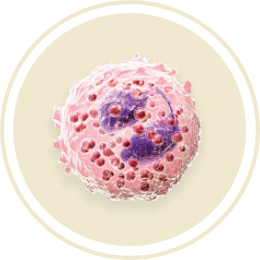How does NUCALA work?2
NUCALA targets eosinophils, but what exactly does that mean?

What are eosinophils?
Eosinophils [ee-uh-sin-uh-fils] are white blood cells that are a normal part of the body's immune system.
How do eosinophils play a role in severe asthma?
Having too many eosinophils in your blood can damage the airways and can cause your asthma to get worse or can increase the number of your asthma flare ups.
NUCALA reduces eosinophils
NUCALA is not a steroid like prednisone. It is designed to reduce the number of eosinophils in your blood.
The mechanism of action of NUCALA is not fully understood.
Reducing the number of eosinophils in your blood may help reduce airway inflammation.
NUCALA helps you gain asthma control and helps reduce your use of oral steroids like prednisone.† It's important to receive your injection of NUCALA once every four weeks as prescribed, even if you're feeling better.
†Results may vary.
A simple blood test can measure the number of eosinophils in your blood
Your doctor can give you a blood test that measures your eosinophil count or refer you to a specialist who will review your asthma with you and request the relevant blood tests. Based on the test results, your specialist will consider whether adding NUCALA to your treatment plan is the right fit for you. In clinical studies, the eosinophil blood test helped identify patients whose asthma was more likely to respond to treatment with NUCALA.1

See what
 NUCALA
NUCALA
can do.
Ready to talk to your doctor?
Important Safety Information:
Do not use NUCALA if you are allergic (hypersensitive) to mepolizumab or any of the ingredients in NUCALA.
Do not use to treat sudden breathing problems.
The most common side effects of NUCALA are headache, injection site reactions (pain, redness, swelling, itching, or a burning feeling at the injection site), back pain, and fatigue.
Tell your doctor or get emergency help right away if you think you are having an allergic reaction to NUCALA.
Any information provided on this website should be discussed with a healthcare professional and does not replace a healthcare professional's advice.
References:
- Data Sheet GlaxoSmithKline New Zealand. Nucala Data Sheet. GSK NZ; 2024. Available at http://www.medsafe.govt.nz/profs/datasheet/dsform.asp (Last accessed March 2025)
- Consumer Medicine Information GlaxoSmithKline New Zealand. Nucala Consumer Medicine Information. GSK NZ; 2023. Available at https://www.medsafe.govt.nz/Medicines/infoSearch.asp (Last accessed March 2025)
- Global Initiative for Asthma. Global Strategy for Asthma Management and Prevention 2025. Available from: www.ginasthma.org (Last accessed June 2025)
- Bernstein D, Pavord ID, Chapman KR et al. Usability of mepolizumab single-use prefilled autoinjector for patient self-administration. J Asthma 2019;28:1-12
By clicking the links, you will be re-directed to a website not owned or monitored by GSK, and GSK is not responsible for the content of that website.
This website is intended for residents of New Zealand only.
